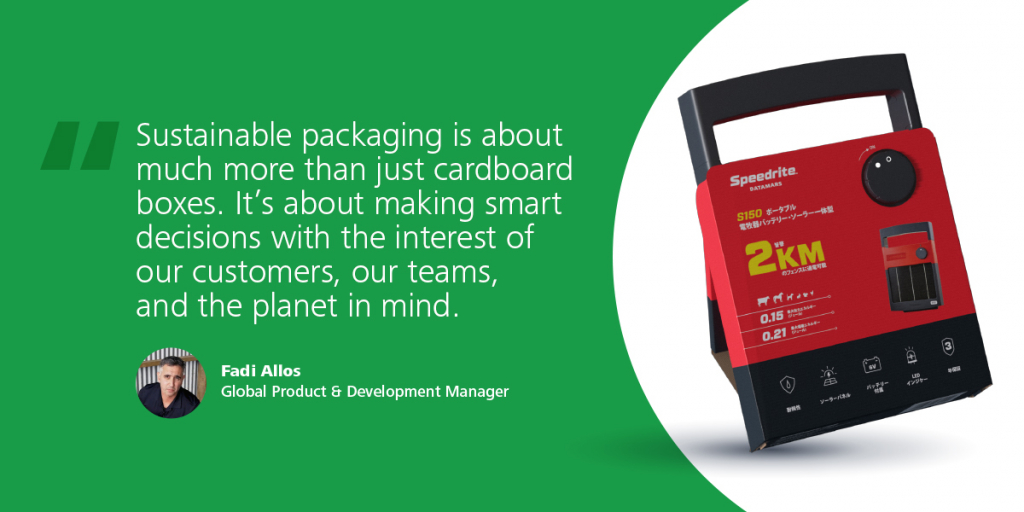
Our Global Product & Development Manager for Livestock Farm Infrastructure (LFI), Fadi Allos, has been with Datamars since graduating from university 15 years ago. Beginning as an Electrical Engineer, Fadi has built his career role by role to where it is today.
Read on to find out more about friendly Fadi and his current role, including a recent passion project – delivering a packaging solution that works for our customers, our team and the planet.
How did you come to work at Datamars?
I was doing a final year project for my Bachelor of Engineering at Auckland University and the judges in our category happened to be from Tru-Test. The company was advertising an electrical engineer role, and I interviewed and began the role a week later working on their electric fencing products. From there I moved into product management, eventually becoming a global product manager.
When Tru-Test was acquired by Datamars in 2018, I continued as a global product manager for Datamars Livestock, based in New Zealand, and my role grew further from there.
Tell us about your current role?
My role manages Livestock Farm Infrastructure as a product category for Datamars Livestock, as well as the related R&D and project management teams.
What do you enjoy about your role?
I love the variation it brings. As a global role it has a lot of touch points, working with the technical team, R&D, and sales and marketing, among others.
I’ve also really enjoyed the role I’ve played in sustainable packaging, being part of the team to make a measurable difference with the packaging for some of our key products.
We take a highly considered approach to sustainable packaging at Datamars, it’s about much more than just cardboard boxes. It’s about making smart decisions with the interest of our customers, our teams, our business, and the planet in mind.
As part of our sustainable packaging programme, and linked to our wider ESG work, we reviewed the environmental impact of our packaging. We identified priority areas for improvement and have developed a phased programme to investigate and address each area. The impact of the first year of projects is an estimated decrease in packaging related greenhouse gas (GHG) emissions of 12%.
We understand new sustainable packaging will be coming out this year for the solar energizer range. Tell us about your involvement in this?
Indeed! This has been a very rewarding project to be a part of – removing the PVC clam shell packaging from our solar energizer range and replacing it with a much more sustainable, fully recyclable version, while maintaining cost competitiveness. The new packaging will be phased to our markets around the globe and different stages this year.
It was a very comprehensive design process. I worked with a team across Global Product Management and Marketing over a period of around a year to land on a cardboard design that is not only fully recyclable and took up a smaller surface area, but it is also made of only one piece of product for efficient and cost-effective printing and assembly (as opposed to the previous three-piece clam shell), and instead of a package handle, utilises the actual product handle for easy carrying in-store.
What’s next?
We’ll be phasing the new packaging into our markets around the globe throughout the coming months of this year and phasing out the PVC clam shells.
In terms of what’s next for sustainable packaging at Datamars overall – we’ve come a long way, but we still have a long way to go. Helped by this solar energizer packaging change, we have removed around 80% of PVC from our packaging so far (PVC is an environmentally damaging plastic). We’ve also removed an additional 2 Tonnes of packaging material per year with the wider changes we implemented in 2024. The team are working on the next suite of improvements, so we hope to reduce our GHG emissions even further while making improvements for our customers and our team.
Why does this matter?
Sustainable packaging is aligned with Datamars’ purpose of making a measurable difference. While we’re delivering technology solutions that help solve some of the world’s challenges by supporting others to be more sustainably productive and manage their use of scarce resources, it’s important that we’re looking at how we can continue to reduce our own environmental footprint.
This article is part of our ongoing communications surrounding Datamars’ first ESG and Sustainability Report. Check out the full report at Datamars.com/sustainability